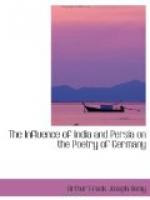A number of poems deal with legends concerning Rumi, or with sayings attributed to him. Thus the legend which tells how the poet, when a boy, was transported to heaven in a vision, as told by Aflaki in the Manaqibu’l ’Arifin,[161] forms the subject of a poem, p. 37. A saying of Rumi concerning music prompted the composition of the poem, p. 54 (on which see Boxberger, op. cit. p. 241), and on p. 62 the great mystic is made to give a short statement of his peculiar Sufistic doctrine of metempsychosis.[162] In “Alexanders Vermaechtnis,” p. 61, we have the well-known legend of how the dying hero gives orders to leave one of his hands hanging out of the coffin to show the world that of all his possessions nothing accompanies him to the grave. In Nidami’s version, however, the hand is not left empty, but is filled with earth.[163]
Finally there are a few poems dealing with Oriental history, of which we may mention “Hormusan,” p. 25, the subject being the same as in Platen’s more famous ballad. It may be that both poets drew from the same source (see p. 37).
* * * * *
In the same year (1837) as the Erbauliches und Beschauliches there appeared the Morgenlaendische Sagen und Geschichten (vol. iv.) in seven books or divisions. In general, the contents of these divisions may be described as versified extracts from Oriental history of prevailingly legendary or anecdotal character. Their arrangement is mainly chronological. Only the fourth, fifth and seventh books call for discussion as having Persian material. The most important source is the great historical work Raudat us-safa of Mirch, portions of which had been edited and translated before 1837 by scholars like de Sacy,[164] Wilken,[165] Vullers[166] and others.[167]
Other sources to be mentioned are d’Herbelot’s Bibliotheque Orientale,[168] de Sacy’s version of the Tarich-i-Yamini[169] and Hammer’s Geschichte der schoenen Redekuenste Persiens.
* * * * *
The first poem of the fourth book goes back to the legendary period of Iran. Its hero is Gustasp, the patron and protector of Zoroaster. Rueckert calls him Kischtasp. He does not give the story directly according to Firdausi (tr. Mohl, iv. 224, 278-281) but makes his hero go to Turan, whence he returns at the head of a hostile army. At the boundary he is met, not by his brother Zarir, but simply by messengers who offer him Iran’s crown. This he accepts and thus becomes king and protector of the realm he was about to assail.[170]
Most of the other poems in this book deal with legends of the Sassanian dynasty. Thus “Schapurs Ball,” p. 114 (Mem. pp. 282-285); “Die Woelfe und Schakale Nuschirwans,” p. 115 (Mem. p. 381); “Die abgestellte Hungersnoth,” p. 116 (Mem. pp. 345, 346); “Die Heerschau,” p. 117 (Mem. p. 373). The two stories about Bahram Cubin, pp. 119-122, are also in Mem. p. 395 and pp. 396, 397 respectively.[171] “Der Mann mit einem Arme,” p. 124, is in Mem. pp. 348, 349. In the last poem “Yesdegerd,” p. 126, Rueckert gives the story of the sad end of the last Sassanian apparently according to different accounts, and not simply according to Firdausi or Mirchvand.




